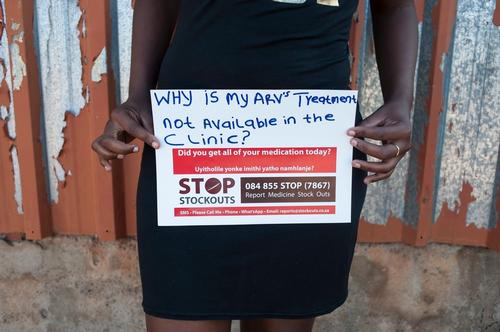Johannesburg – A new survey released today shows that shortages of essential HIV and tuberculosis medicines in most South African provinces are a systematic obstacle to the success of the largest antiretroviral treatment program in the world, said the civil society organisation Stop Stock Outs Project during the South Africa AIDS Conference currently underway in Durban.
Drug stock outs mean that health centers are unable to dispense the complete amount of one or more HIV or TB medication to patients, most often despite their availability at the depots. At the time of the survey, conducted during the fourth quarter of 2014, five out of the nine South African provinces were most severely affected, with more than one in three health facilities reporting shortage of a drug used for HIV or tuberculosis. 32% of the stock outs lasted for over a month, and 25% less than a week. “Most of the essential drugs are here in the country, but they are not in the patients’ bodies. This is a symptom of a suffering health system”, says Anele Yawa, national secretary of the patients’ rights activist group Treatment Action Campaign. Addressing stock outs is vital in South Africa where 18.5% of the adults are living with HIV and close to three million people are on antiretroviral treatment (ARV).
“This situation is unacceptable because patients are the ones paying the price for a dysfunctional system. They miss out on work or school to queue at a health facility, only to be told there is no medication or they need to come back again. Then they have to live with the stress of an untreated disease that puts them at risk of further illness or death. Patients are expected to remain adherent to treatment and are labelled "defaulters" when they don't. But is this fair when our health departments are defaulting on their medicine supply?” says Dr Indira Govender of the Rural Doctors Association of South Africa.
The survey shows that most drugs are available in South Africa’s medicine depots but patients are unable to get their prescriptions filled in local health centers because of local logistical and management problems, ranging from inaccurate forecasting to storage or transport issues. Only a minority of shortages are due to pharmaceutical companies being unable to provide enough drugs worldwide.
The survey results are comparable to those of a previous one conducted in 2013. The good news this year is the improvement of the availability of the most commonly prescribed fixed dose combination drug for HIV patients. However, there have been frequent stock outs of other HIV and TB medicines. Patients who require medicine other than the standard first line HIV drug are often already more vulnerable because they have clinical complications or because they are children or adolescents.
“As South Africa is planning to scale up the number of people on treatment from approximately 3 million to 4.6 million by the end of 2016, it is all the more urgent to address a complex and deep rooted issue that is hampering the ability to run the largest ARV program in the world. There is hope, as in the past year several leading health authorities in South Africa, both at national level and in some provinces, have acknowledged the problem and actively engaged with civil society to take steps in solving it. It shows a welcome willingness to improve things for the public good, even in the face of a very complex challenge that won’t be solved overnight”, says Bella Hwang, coordinator of the Stop Stock Outs Project.
Testimonies patients, medical staff
The Stop Stock Outs survey collected data from two thirds of South African hospitals and clinics over a period of six weeks. The Project also actively works with individual patients, health care workers and civil society organizations that report shortages on a daily basis through a free hotline.
“In no other country in the region are there similar surveys offering such a clear visibility of the scope of the problem and the impact of stock outs on patients. Logistical and managerial challenges leading to stock outs are widespread though and will have to be addressed in all countries with growing numbers of HIV patients in need of treatment,” says Tinne Gils, regional pharmacist for MSF. “Lessons to be taken from this experience are the importance of strong political will and commitment from governments to acknowledge and tackle stock outs, as well as the critical role for patients and civil society organizations to hold their governments accountable and collaborate with them to improve health for all by providing information on what they experience and witness”.
As the result of constructive engagement between civil society, national and provincial health authorities, five out of nine South African provinces have for the first time produced action plans included in the report. The remaining provinces have acknowledged the extent of the problem but have not yet committed to taking any action.



